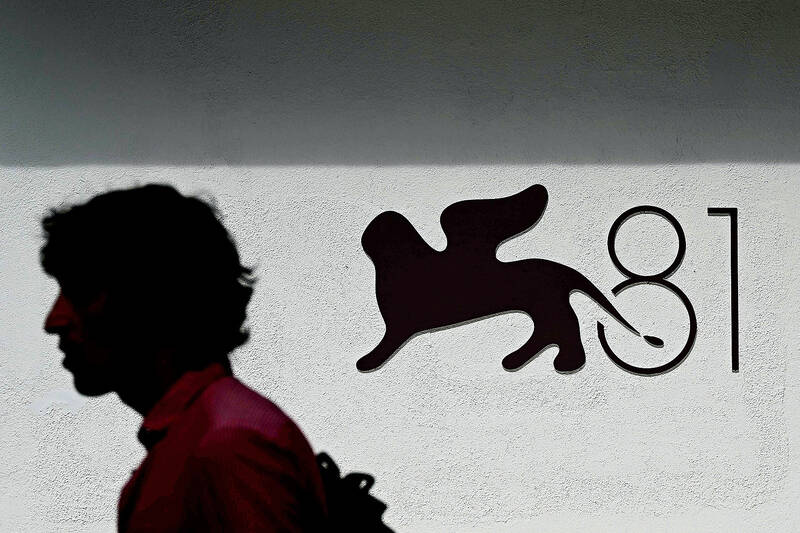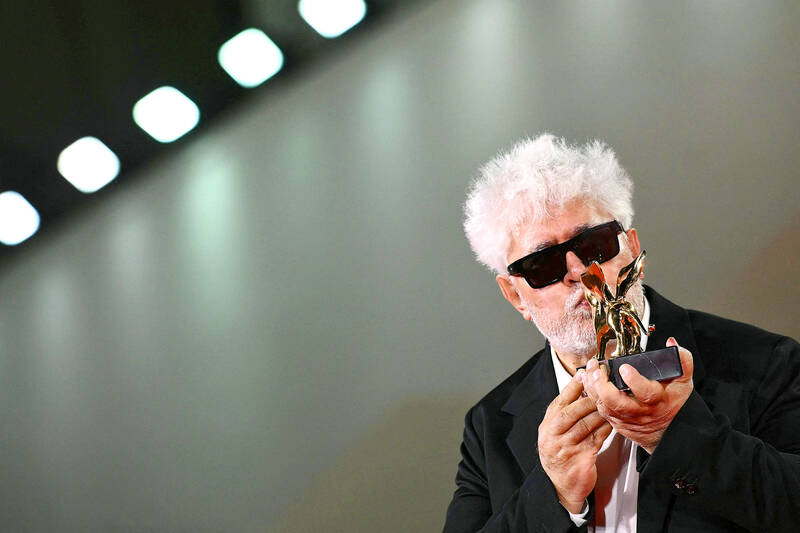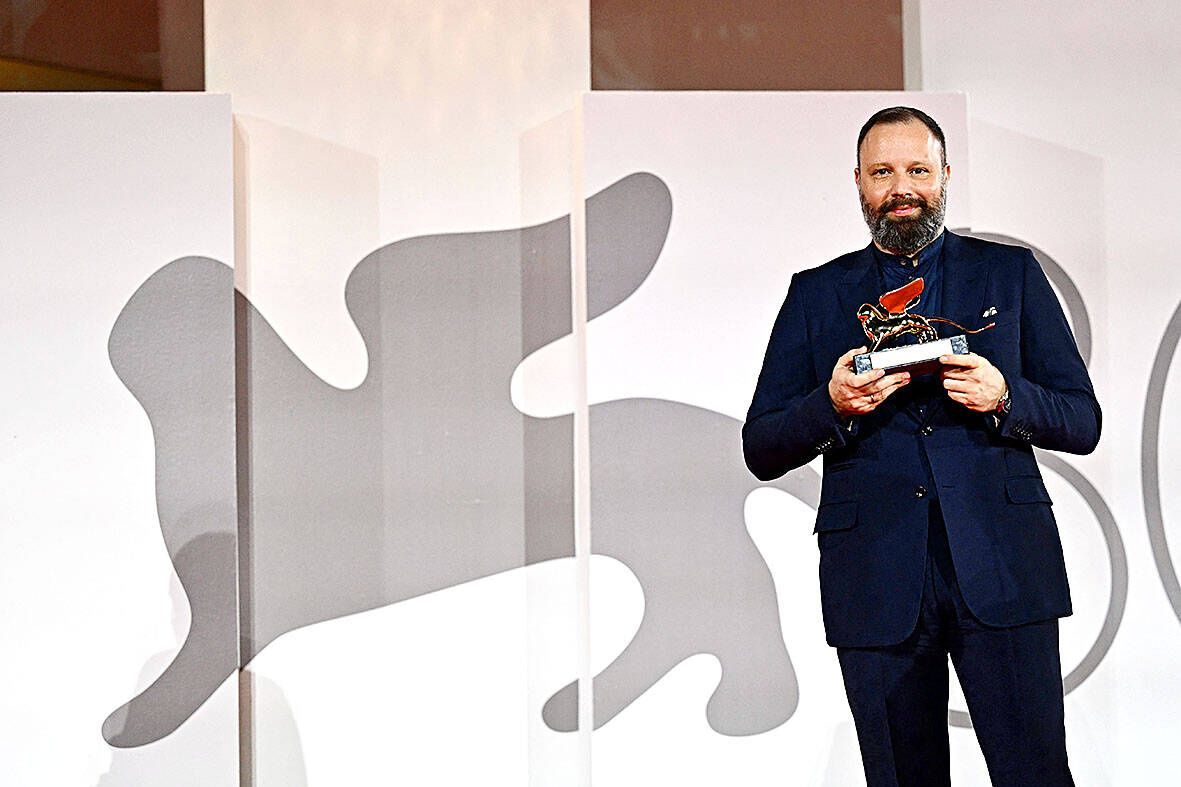Frankenstein’s monster, Vladimir Putin, vindictive bosses, nuclear war and at the end a Golden Lion. The 82nd Venice Film Festival begins tomorrow.
Dozens of stars are expected on the Lido, major directorial talents are bidding for comebacks and a strong field of films are competing.
Here are some of the anticipated highlights and talking points for the Aug. 27 to Sept. 6 glam-fest:

Photo: AFP
THE MAIN COMPETITION
A total of 21 films are in the running for the Golden Lion, the festival’s top prize, won last year by The Room Next Door by Spanish director Pedro Almodovar.
The most keenly awaited titles include:

Photos: AFP
— The Wizard of the Kremlin by Olivier Assayas
An adaptation of a best-selling book of the same name about Putin’s rise to power, featuring British actor Jude Law as the Russian president.
— A House of Dynamite by Kathryn Bigelow

Photo: AFP
The first film since 2017 by the Oscar-winning director of Zero Dark Thirty which sees White House officials grappling with a missile and nuclear weapons crisis.
— The Smashing Machine by Benny Safdie Dwayne “The Rock” Johnson is cast in what appears a tailor-made role as an aging wrestler, with Emily Blunt as his wife.
— The Voice of Hind Rajab by Kaouther Ben Hania
This drama reconstructing the real-life killing of a six-year-old Palestinian girl by Israeli troops in Gaza is set to be one of the festival’s most political films.
— The Testament of Ann Lee by Mona Fastvold
A musical film about a religious sect in the US by the co-writer of The Brutalist, again working with her director husband Brady Corbet.
— Frankenstein by Guillermo del Toro
A new big-budget version of the cinema classic by the Mexican director, starring hard-working Oscar Isaac, who is featured in two major Venice films.
— Jay Kelly by Noah Baumbach
A comedy co-written by Baumbach and his wife Greta Gerwig, featuring an A-list cast led by George Clooney, who plays an actor with an identity crisis.
— Bugonia by Yorgos Lanthimos
The latest collaboration between the Greek director and Emma Stone, who won an Oscar for her performance in their 2023 film Poor Things, which won Venice’s Golden Lion.
— No Other Choice by Park Chan-wook
The South Korean auteur Park returns to Venice after two decades with a thriller about a vindictive manager who loses his job.
— The Stranger by Francois Ozon
An ambitious new adaptation of French author Albert Camus’s masterful novella of the same name, shot in black-and-white.
— Nuhai (Girl) by Shu Qi (舒淇) Taiwanese superstar Shu makes her directorial debut with a story about multiple generations of women.
BEST OF THE REST
— After the Hunt by Luca Guadagnino
Julia Roberts makes her Venice debut for the premiere of this cancel culture-themed drama about a sexual assault case at a prestigious American university.
— In the Hand of Dante by Julian Schnabel
Held up by a dispute between the director and his financial backers over its 150-minute length, this crime thriller stars Isaac, with cameos from veterans Al Pacino and John Malkovich.
— Dead Man’s Wire by Gus Van Sant
The American director’s first movie since 2018 centers on a real-life hostage drama at a loan agency, with performances by Bill Skarsgard and Pacino.
Others to watch include big-budget French thriller Chien 51, which will close the festival, and Scarlet by Japanese animator Mamoru Hosoda.
DOCUMENTARIES
German director Werner Herzog’s latest film, Ghost Elephants, about a mythical herd of elephants in Angola, stands out. So too does a portrait of veteran American journalist Seymour Hersh by Laura Poitras, who returns to Venice after winning its top prize in 2022 for her documentary about activist photographer Nan Goldin’s campaign against the opioid industry.
Other headliners include Sofia Coppola’s intimate documentary about her friend the fashion designer Marc Jacobs, as well as Broken English by Jane Pollard and Iain Forsyth about British singer Marianne Faithfull, who died in January.
Viewers will need patience — and a strong bladder — for Director’s Diary, a five-hour epic by dissident Russian director Alexander Sokurov based on his personal diary notes from the Soviet era.
ALSO SHOWING
Netflix has three films in competition — Frankenstein, A House of Dynamite and Jay Kelly — showcasing some of its best hopes of clinching its first Best Picture award at the Oscars next year.
The increasingly long run-times of films — averaging 2 hours and 15 minutes to 2 hours 30 minutes at Venice, according to Artistic Director Alberto Barbera — caused him to grumble about the difficulty of fitting them all in the schedule.

The Lee (李) family migrated to Taiwan in trickles many decades ago. Born in Myanmar, they are ethnically Chinese and their first language is Yunnanese, from China’s Yunnan Province. Today, they run a cozy little restaurant in Taipei’s student stomping ground, near National Taiwan University (NTU), serving up a daily pre-selected menu that pays homage to their blended Yunnan-Burmese heritage, where lemongrass and curry leaves sit beside century egg and pickled woodear mushrooms. Wu Yun (巫雲) is more akin to a family home that has set up tables and chairs and welcomed strangers to cozy up and share a meal

Dec. 8 to Dec. 14 Chang-Lee Te-ho (張李德和) had her father’s words etched into stone as her personal motto: “Even as a woman, you should master at least one art.” She went on to excel in seven — classical poetry, lyrical poetry, calligraphy, painting, music, chess and embroidery — and was also a respected educator, charity organizer and provincial assemblywoman. Among her many monikers was “Poetry Mother” (詩媽). While her father Lee Chao-yuan’s (李昭元) phrasing reflected the social norms of the 1890s, it was relatively progressive for the time. He personally taught Chang-Lee the Chinese classics until she entered public

Last week writer Wei Lingling (魏玲靈) unloaded a remarkably conventional pro-China column in the Wall Street Journal (“From Bush’s Rebuke to Trump’s Whisper: Navigating a Geopolitical Flashpoint,” Dec 2, 2025). Wei alleged that in a phone call, US President Donald Trump advised Japanese Prime Minister Sanae Takaichi not to provoke the People’s Republic of China (PRC) over Taiwan. Wei’s claim was categorically denied by Japanese government sources. Trump’s call to Takaichi, Wei said, was just like the moment in 2003 when former US president George Bush stood next to former Chinese premier Wen Jia-bao (溫家寶) and criticized former president Chen

President William Lai (賴清德) has proposed a NT$1.25 trillion (US$40 billion) special eight-year budget that intends to bolster Taiwan’s national defense, with a “T-Dome” plan to create “an unassailable Taiwan, safeguarded by innovation and technology” as its centerpiece. This is an interesting test for the Chinese Nationalist Party (KMT), and how they handle it will likely provide some answers as to where the party currently stands. Naturally, the Lai administration and his Democratic Progressive Party (DPP) are for it, as are the Americans. The Chinese Communist Party (CCP) is not. The interests and agendas of those three are clear, but